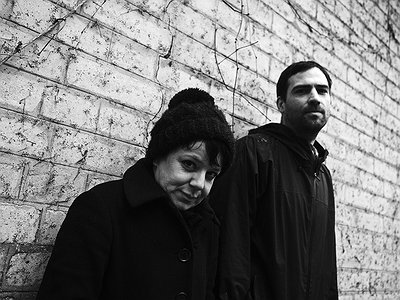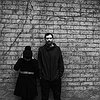Part 1
Names: Sara Oswald, Manuel Oberholzer (Feldermelder)
Nationalities: Swiss
Occupation: Cellist, composer, improviser (Sara Oswald), Sound artist, composer (Feldermelder)
Current release: Sara Oswald + Feldermelder's Drawn is available from -OUS. Also still available is their previous collaboration Hidden in Kaoris Castle.
Recommendations:
Sara Oswald:
A book: Dalva (Jim Harrison)
Photograph: Vincent Munier (absolute quiteness)
Piece of music: cum dederit (extrait from nisi dominus de Vivaldi)
Manuel Oberholzer (Feldermelder):
A book: The Savage Detectives, Roberto Bolano
Photograph: Met Museum, New York City. 1988. Elliot Erwittt Piece of music: Solarium by Maxime Denuc
If you enjoyed this interview with Sara Oswald + Feldermelder, find out more about them on their respective websites: Sara Oswald; Feldermelder.
Both Sara and Manuel are part of the artist collective around the formidable -OUS imprint. For more information, take a look at our IOKOI interview and our Noémi Büchi interview.
When did you start writing/producing music - and what or who were your early passions and influences? What was it about music and/or sound that drew you to it?
Manuel: I started extremely young, sometime in the 80s with Tracker music software that came along with my first little commodore machine. At the time, I had no plan, and didn’t even know there was something like being a musician.
It was definitely more about the sound of things that drew me in. I’ve never had any real music lessons, so I just always did it by ear. Everything I do comes from listening to sounds that make my brain tickle.
Sara: I started writing music for a fashion show commission. About 10 years ago. I was very afraid, because I come from classical music, and in this environment, oftentimes, to dare to have credit, you have to have a long study and a degree.
I found my master when I was 17. A baroque cellist who still remains the best I know. I listened and worked a lot on this music, and then I discovered improvisation, which led me to other music. I discovered Radiohead, which completely stunned and upset me. It is a privilege for me to have had access to all kinds of music, because these influences are so diverse.
For most artists, originality is preceded by a phase of learning and, oDen, emulating others. What was this like for you: How would you describe your own development as an artist and the transition towards your own voice?
Manuel: It seems like the learning phase is never ending and has transformed into a continuous motion towards the unknown. There is simply no finish line. As far as influences go, I was more influenced by the aesthetics of mainly non musicians growing up around me. I lived far off the musical centres of the world, so I was mainly stuck with my own voice and my own perceptions of how things should sound and be shaped.
Sara: For my part, I benefited from many high level teachings (professional training to become a cellist, baroque cellist, improvisation teacher, instrument teacher). I also played in many pop, rock, industrial, contemporary and jazz bands. I think that all these people with whom I had the chance to participate in projects influenced me, by the sound, by the inventiveness, by the emulation of exchanges, by the writing. I feel grateful for the richness of all that. With Manu, it brings me to something else, and I particularly like the treatment of the sounds and the space that we share.
How do you feel your sense of identity influences your creativity?
Sara: I have the impression that what I play, improvise, whether in the duet with Manu or in my solo project, is intimately linked. I can't dissociate the person I am from what I play musically.
Manuel: I agree with Sara that everything is interlinked. I don’t have written rules or things I go by to shape my identity. For me, most social (etc) norms make no sense at all, so I define my identity by the things I don’t want in my life. With this in mind I can be totally free in the realm of creativity.
What were your main creative challenges in the beginning and how have they changed over time?
Manuel: In the beginning I was just experimenting with sounds without any higher goals. Later on it became a challenge to recreate the ideas I had in my mind with my super low-fi tools. So technical challenges were my first creative challenge.
Now that everything has become accessible and possible, it is more about finding time to do all the projects that I am interested in. Besides that, I am super privileged with the musicians I am allowed to play with, so the challenge for me is to keep up with properly trained musicians. But maybe it is just in my head. In our collaboration we try to define new grounds and intertwine our musical backgrounds to create this shared sonic space for a short moment.
Sara: I think I was so afraid of not finding inspiration, of not knowing how to transcribe what I was hearing. Now, with more practice, I can be more responsive to what Manu suggests, and also I have been able to develop a wider range of vocabulary.
As creative goals and technical abilities change, so does the need for different tools of expression, be it instruments, software tools or recording equipment. Can you describe this path for you, starting from your first studio/first instrument? What motivated some of the choices you made in terms of instruments/ tools/equipment over the years?
Sara: I started with the piano, followed by the cello, which is an instrument that requires a lot of technique to really extract the finesse of what you're looking for in terms of sound and texture. Today, I feel that the possibilities of this instrument are almost infinite, especially when I use small objects that I add to create new sounds (aluminum foil, clothespins, gum, etc.), or when I develop my vocabulary with effects pedals.
And now, with what Manu brings to our collaboration, my sounds are mirrored again and again, through which I discover new possibilities. It's infinite!
Manuel: I am a complete junkie in testing material and software, if then it gets integrated into my workflow is another thing, but I will test most software that I come across, probably some remnants from the time I was seeking the slightest new functions. Now, by being involved in the SMEM in Fribourg, I have access to all the synths in the world. So it has transformed into a hunt for special sounding acoustic objects I own are in use because I need them. I never want to have waste around me.
Have there been technologies or instruments which have profoundly changed or even questioned the way you make music?
Manuel: I think the grid view in Ableton Live had one of the biggest impacts, even though I just use it for live shows, installations and experiments. But this other way of alignment and the given freedom to change the lengths of the files by milliseconds, and have them loop, being that information or audio, opened up a whole range of possibilities and ideas.
Another impact I want to mention is the whole concept of modular software, Reaktor, MaxMSP or similar, through which I am able to build and/or remove functions and create little softwares to be implemented into all kinds of projects. This way of thinking was definitely a development that sparked much for me.
Sara: Yes, of course! When I saw what plug-in effects could do to a simple bowed cello sound, I wanted to know more. Each time I dive in, a whole new world opens up. But it doesn't take away from the work on the instrument, the precision. It shouldn't act as a palliative to technical difficulties in my opinion.
Collaborations can take on many forms. What role do they play in your approach and what are your preferred ways of engaging with other creatives through, for example, file sharing, jamming or just talking about ideas?
Manuel: Playing with others was a kind of torture in the beginning of my musical career. Until I realised it was because they didn’t want the same things as I did, both aesthetically and sonically. So my early years were spent in a solo world.
Since then, I have had the privilege to play with extraordinarily talented people: Sara Oswald, Julian Sartorius, Davide Tomat, Nhk Koyxen, and recently Noémi Büchi. Although I like to talk to people about ideas, I’ve learned that for me it is exclusively possible to play with somebody if I don’t have to talk about music too much. I need to have total trust in their abilities so I can concentrate on listening, reacting and advancing ideas they propose while we’re playing and/or recording.
Sara: I have had the chance to participate in all kinds of projects: cinema, theatre, music, but also in other fields that have nothing to do with my work: cooking, photography, projects related to the mountains, architecture, etc. For me, collaboration is an endless enrichment. This is what I prefer to do in my job: to meet and exchange. I think the thing that plagues our world is the fear of the other. We must always be attentive to remaining open, even if otherness is fundamentally frightening.
I am lucky enough to have a job where meeting the other is essential to enrich my creation.






